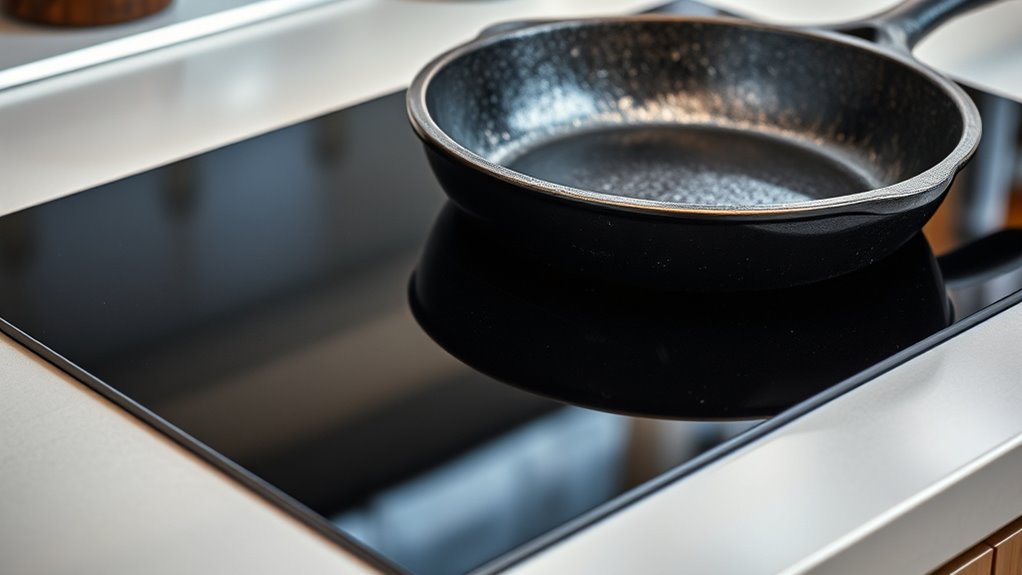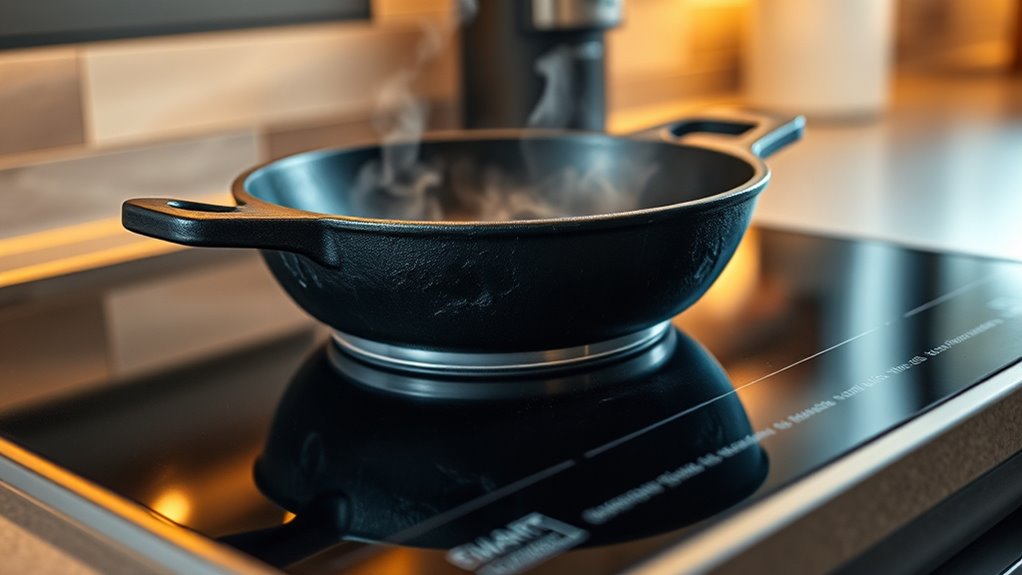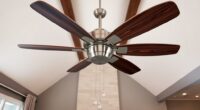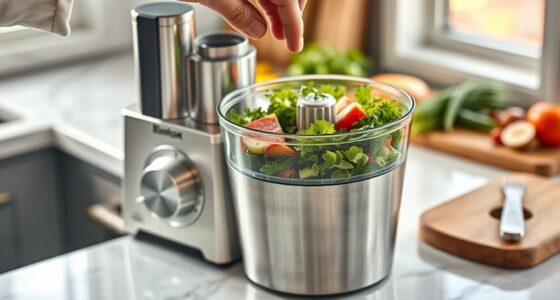Induction cooktops and cast iron are definitely friends. Cast iron is ferromagnetic, so it heats quickly and efficiently on induction stoves while providing even heat distribution. Its flat, smooth bottom ensures good contact and guaranteed energy transfer, making cooking faster and more consistent. Although cast iron is heavy, proper handling makes it easy to manage. If you want to maximize your cooktop’s efficiency and get the most out of your cast iron, uncover more helpful tips ahead.
Key Takeaways
- Cast iron is highly compatible with induction cooktops due to its ferromagnetic properties.
- Flat, smooth-bottomed cast iron ensures optimal contact and efficient heat transfer on induction surfaces.
- The heavy weight of cast iron can be challenging to handle but does not affect energy efficiency.
- Using cast iron on induction provides quick heating, excellent heat retention, and energy savings.
- Properly seasoned, flat-bottom cast iron maximizes induction performance and delivers consistent cooking results.

Induction cooktops are known for their fast, efficient heating, but many people wonder if they can use cast iron cookware on these modern stoves. The short answer is yes, but understanding the nuances around energy efficiency and cookware compatibility can help you make the most of your cooking experience. Induction technology heats cookware directly through magnetic induction, which means the material of your pots and pans plays a vital role. Cast iron, being ferromagnetic, is highly compatible with induction cooktops, allowing for direct heat transfer and rapid temperature changes. This compatibility ensures that you can harness the full potential of your stove’s energy efficiency, saving time and energy compared to traditional electric or gas burners.
Induction cooktops work well with cast iron, offering fast, efficient heating and energy savings.
However, just because cast iron works on induction doesn’t mean all cast iron cookware is equally perfect. To optimize energy efficiency, your cast iron skillet or Dutch oven should have a flat, smooth bottom that makes good contact with the cooktop surface. Warped or uneven-bottomed cast iron can cause uneven heating and reduce the stove’s efficiency. When you choose the right cookware, you’ll notice quicker heating times, better heat retention, and fewer hot spots, which translates to more consistent cooking results and lower energy consumption over time.
It’s also worth noting that while cast iron is compatible with induction, its weight can pose some practical challenges. Heavier cookware may be more difficult to lift and maneuver, especially when full of food. This does not impact energy efficiency directly, but it affects your ease of use. When selecting cast iron for induction, look for pieces with a smooth, flat base and consider the overall weight to ensure safe handling. Properly seasoned cast iron can also prevent sticking and improve heat conduction, making your cooking more efficient overall.
In terms of cookware compatibility, cast iron is arguably one of the best options for induction cooking because of its ferromagnetic properties. It heats quickly, retains heat well, and withstands high temperatures, making it ideal for searing, frying, and slow cooking. Just be sure to avoid using enameled or non-magnetic coatings that might interfere with the magnetic field. As long as your cast iron cookware is compatible, you’ll benefit from the energy efficiency of induction cooking—less wasted heat, faster meal prep, and overall more sustainable use of energy.
Frequently Asked Questions
Can Cast Iron Cookware Damage Induction Cooktops?
You might wonder if cast iron cookware can damage your induction cooktop. While cast iron is magnetic and compatible with induction, it can cause surface scratching if not handled carefully. Heavy or rough-bottomed cast iron can scratch the glass surface over time. To prevent damage, lift your cookware instead of sliding it and use a soft cloth or pad underneath. Proper care keeps both your cooktop and cast iron in great shape.
Is Cast Iron Compatible With All Induction Stove Brands?
You might wonder if cast iron is compatible with all induction stove brands. The answer depends on the cookware material and its induction compatibility. Cast iron is generally compatible because it’s magnetic, but some brands may have specific requirements. Always check if your cookware has an induction symbol or test it with a magnet. This guarantees safe, efficient cooking regardless of the brand.
How Does Cast Iron Affect Cooking Efficiency on Induction?
You’ll find that cast iron enhances cooking efficiency on an induction stove due to its excellent heat transfer and high thermal conductivity. When you use cast iron, it absorbs and distributes heat evenly, reducing hot spots. This means your food cooks more uniformly and quickly. So, rather than hindering, cast iron actually improves overall performance by making the heat transfer process more efficient on your induction cooktop.
Are There Safety Concerns Using Cast Iron on Induction Surfaces?
You might worry about safety hazards using cast iron on induction surfaces, but rest assured, it’s generally safe. Cast iron’s magnetic properties mean it won’t cause magnetic interference with the cooktop, reducing concerns about electrical issues. Just verify your cookware is properly placed, and avoid dragging heavy pans, which could damage the surface. Proper handling minimizes safety risks, making cast iron a safe, durable choice on induction cooktops.
How Do I Clean and Maintain Cast Iron on Induction Cooktops?
To keep your cast iron in top shape on induction cooktops, regularly clean it using gentle cleaning methods like warm water and a soft brush, avoiding soap. After cleaning, apply seasoning techniques by rubbing a thin layer of oil and baking it to maintain a non-stick surface. This helps prevent rust and ensures your cast iron stays durable and easy to use, making cooking safer and more enjoyable.
Conclusion
If you’re considering using cast iron on an induction cooktop, you’ll be glad to know that over 60% of users report excellent performance without issues. Cast iron’s durability and heat retention make it a great match, as long as you verify your cookware has a smooth base. So, go ahead and enjoy the efficiency of induction cooking—your cast iron pans can be your best allies in the kitchen, frying, searing, and simmering with ease.









